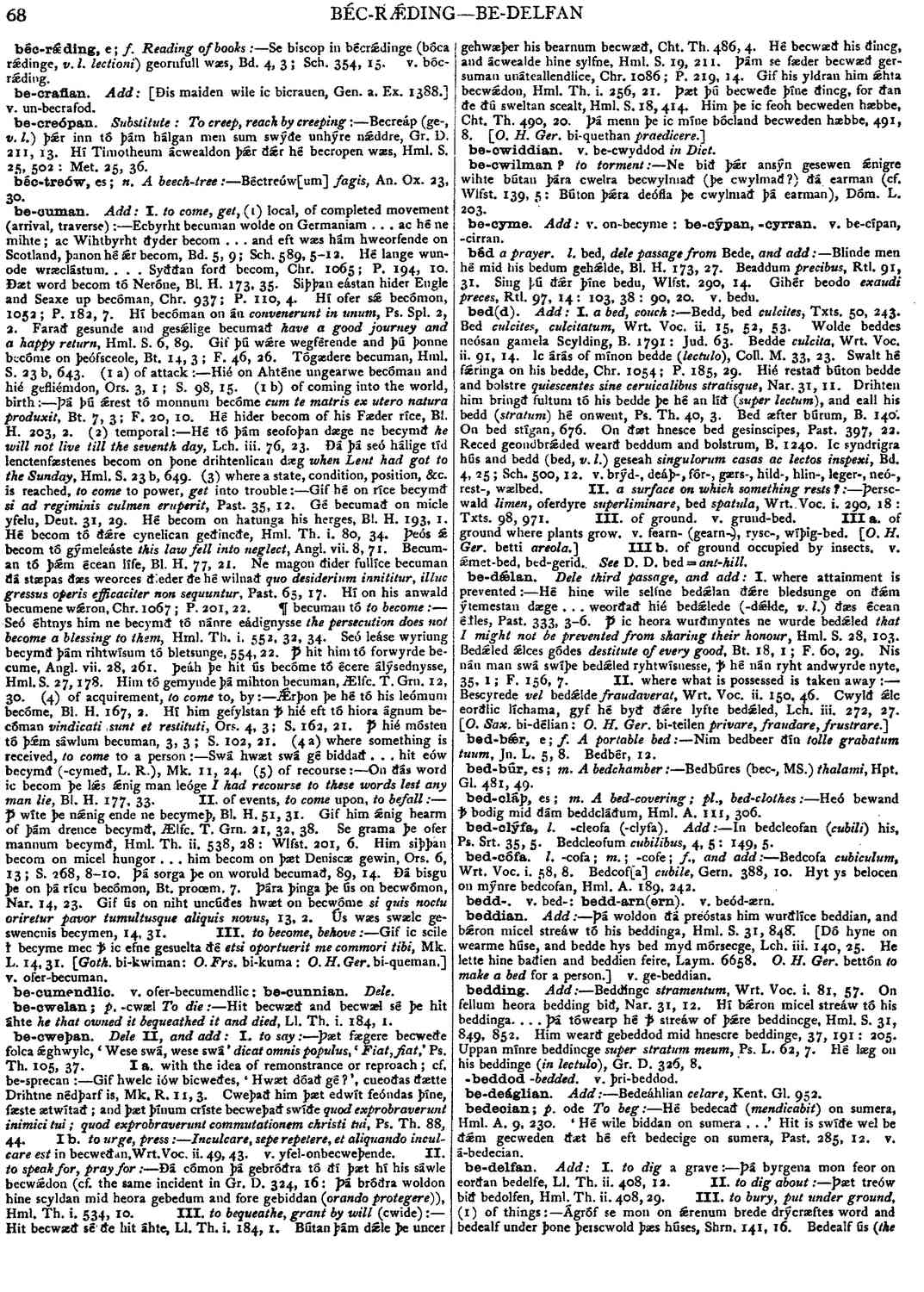be-cuman
-
Ecbyrht becuman wolde on Germaniam . . . ac hé ne mihte; ac Wihtbyrht ðyder becom . . . and eft wæs hám hweorfende on Scotland, þanon hé ǽr becom,
- Bd. 5, 9 ;
- Sch. 589, 5-12.
-
Hé lange wunode wræclástum. . . . Syððan forð becom,
- Chr. 1065 ;
- P. 194, 10.
-
Ðæt word becom tó Neróne,
- Bl. H. 173, 35.
-
Siþþan eástan hider Engle and Seaxe up becóman,
- Chr. 937 ;
- P. 110, 4.
-
Hí ofer sǽ becómon,
- 1052 ;
- P. 182, 7.
-
Hí becóman on án
convenerunt in unum,
- Ps. Spl. 2, 3.
-
Farað gesunde and gesǽlige becumað
have a good journey and a happy return,
- Hml. S. 6, 89.
-
Gif þú wǽre wegférende and þú þonne becóme on þeófsceole,
- Bt. 14, 3 ;
- F. 46, 26.
-
Tógædere becuman,
- Hml. S. 23 b, 643.
-
Hié on Ahténe ungearwe becóman and hié gefliémdon,
- Ors. 3, 1 ;
- S. 98, 15.
-
Þá þú ǽrest tó monnum becóme
cum te matris ex utero natura produxit,
- Bt. 7, 3 ;
- F. 20, 10.
-
Hé hider becom of his Fæder ríce,
- Bl. H. 203, 2.
-
Hé tó þám seofoþan dæge ne becymð
he will not live till the seventh day,
- Lch. iii. 76, 23.
-
Ðá þá seó hálige tíd lenctenfæstenes becom on þone drihtenlican dæg
when Lent had got to the Sunday,
- Hml. S. 23 b, 649.
-
Gif hé on ríce becymð
si ad regiminis culmen eruperit,
- Past. 35, 12.
-
Gé becumað on micle yfelu,
- Deut. 31, 29.
-
Hé becom on hatunga his herges,
- Bl. H. 193, 1.
-
Hé becom tó ðǽre cynelican geðincðe,
- Hml. Th. i. 80, 34.
-
Þeós ǽ becom tó gýmeleáste
this law fell into neglect,
- Angl. vii. 8, 71.
-
Becuman tó þǽm écean lífe,
- Bl. H. 77, 21.
-
Ne magon ðider fullíce becuman ðá stæpas ðæs weorces ðieder ðe hé wilnað
quo desiderium innititur, illuc gressus oferis efficaciter non sequuntur,
- Past. 65, 17.
-
Hí on his anwald becumene wǽron,
- Chr. 1067 ;
- P. 201, 22.
¶ becuman tó to become:--
-
Seó éhtnys him ne becymð tó nánre eádignysse
the persecution does not become a blessing to them,
- Hml. Th. i. 552, 32, 34.
-
Seó lease wyriung becymð þám rihtwísum tó bletsunge,
- 554, 22.
-
Ꝥ hit him tó forwyrde becume,
- Angl. vii. 28, 261.
-
Þeáh þe hit ús becóme tó écere álýsednysse,
- Hml. S. 27, 178.
-
Him tó gemynde þá mihton becuman,
- Ælfc. T. Grn. 12, 30.
-
Ǽrþon þe hé tó his leómum becóme,
- Bl. H. 167, 2.
-
Hí him gefylstan ꝥ hié eft tó hiora ágnum becóman
vindicati sunt et restituti,
- Ors. 4, 3 ;
- S. 162, 21.
-
Ꝥ hié mósten tó þǽm sáwlum becuman,
- 3, 3 ;
- S. 102, 21.
-
Swá hwæt swá gé biddað . . . hit eów becymð (-cymeð, L. R.),
- Mk. 11, 24.
-
On ðás word ic becom þe lǽs ǽnig man leóge
I had recourse to these words lest any man lie,
- Bl. H. 177, 33.
-
Ꝥ wíte þe nǽnig ende ne becymeþ,
- Bl. H. 51, 31.
-
Gif him ǽnig hearm of þám drence becymð,
- Ælfc. T. Grn. 21, 32, 38.
-
Se grama þe ofer mannum becymð,
- Hml. Th. ii. 538, 28: Wlfst. 201, 6.
-
Him siþþan becom on micel hungor . . . him becom on þæt Deniscæ gewin,
- Ors. 6, 13 ;
- S. 268, 8-10.
-
Þá sorga þe on woruld becumað,
- 89, 14.
-
Ðá bisgu þe on þá rícu becómon,
- Bt. proœm. 7.
-
Þára þinga þe ús on becwómon,
- Nar. 14, 23.
-
Gif ús on niht uncúðes hwæt on becwóme
si quis noctu oriretur pavor tumultusque aliquis novus,
- 13, 2.
-
Ús wæs swælc geswencnis becymen,
- 14, 31.
-
Gif ic scile ł becyme mec ꝥ ic efne gesuelta ðé
etsi oportuerit me commori tibi,
- Mk. L. 14, 31.
Bosworth, Joseph. “be-cuman.” In An Anglo-Saxon Dictionary Online, edited by Thomas Northcote Toller, Christ Sean, and Ondřej Tichy. Prague: Faculty of Arts, Charles University, 2014. https://bosworthtoller.com/39665.
Checked: 1